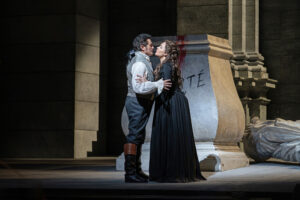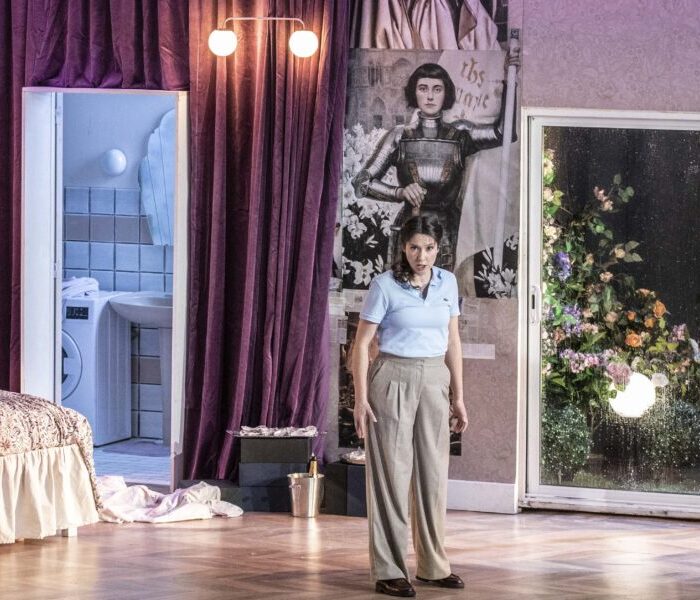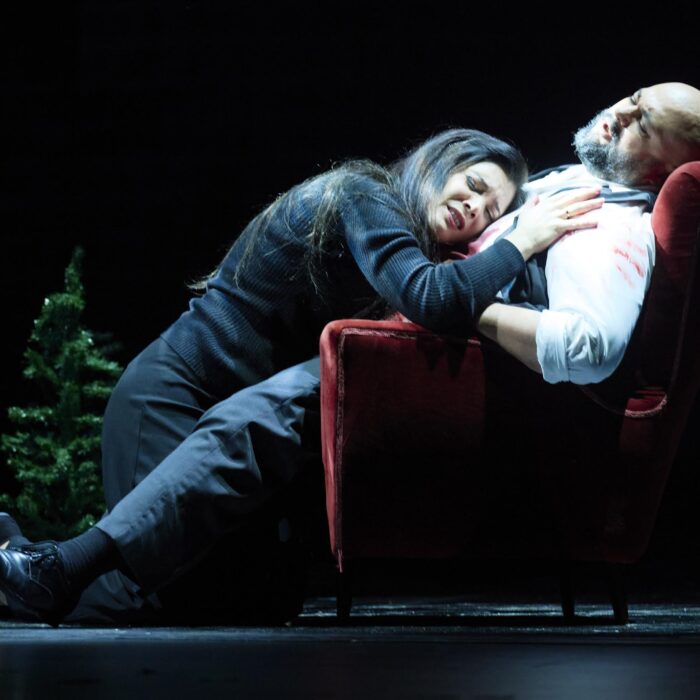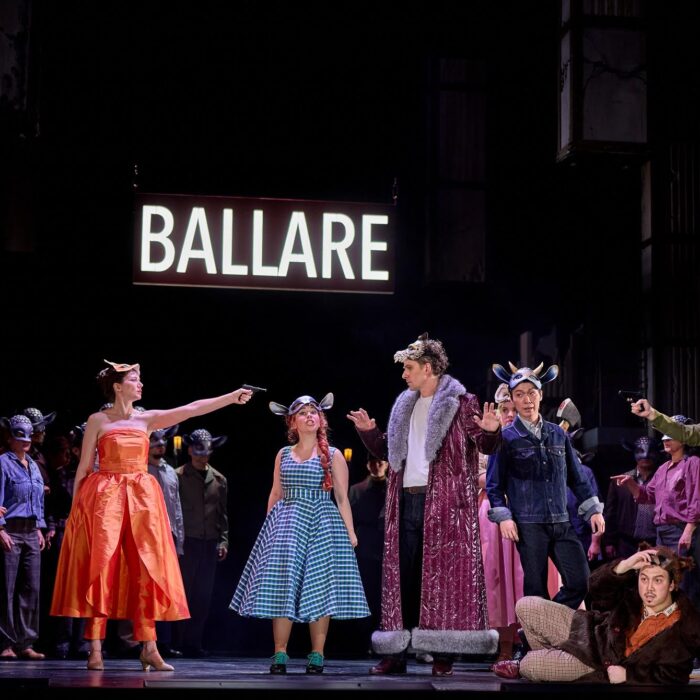
Metropolitan Opera 2025-26 Review: Andrea Chénier
Three Stars Light Up the Stage of Verismo Masterwork
By David Salazar(Credit: Karen Almond / Met Opera)
Giordano’s “Andrea Chénier” is a glorious opera. Full of lush melodies, an elegant libretto, tense dramatic set pieces, and a propulsive pace it always baffles me how little attention it has gotten at the Metropolitan Opera in recent years.
Since premiering in 1921, it has had 186 performances with the most recent prior to the 2025-26 season being in 2014. The reasons for its infrequency might seem obvious: the main three characters need to be embodied by opera stars at the peak of their powers. And yet, that reasoning doesn’t work with me. We can make that claim of any opera if the performance is meant to be any good and in looking back at the past decade-plus, there have been plenty of great artists who could have taken on this verismo gem.
Either way, the Met’s decision to revive this opera in its suitably vibrant production by Nicholas Joël with J. Knighten Smit as revival director is welcome.
For those unfamiliar with production, Joël’s production is very much in the traditional mold with some strong artistic choices. Act one features a massive mirror to set the stage for the Château de Coigny with corresponding couches and a harp. It’s minimalist and yet once all the artists come in in their sumptuous period-specific outfits, the space feels alive. The mirror is a perfect metaphor for a ruling class that never so much as looks around themselves.
Act two takes place in a plaza along Cours-la-Reine following the French revolution and it too bustles with people under an arc. It’s vibrant and as staged, full of energy and hope.
Act three takes place in a Courtroom of the Revolutionary Tribunal. It feels akin to a theater and in bearing the mirror from Act one in mind, presents a reflection of the audience in the theater watching the opera unfold. Act four takes place in the prison with the Guillotine dominating in the background. A blood-stained slab states “Liberté.” Nothing ground-breaking aesthetically, but it’s effective in its specific choices. It always feels lived-in and allows the music and drama to breathe coherently. It also displays confident direction because it shows trust in the work itself without the need for a director to insert himself to lecture the audience (in my view a sign of weak direction by way of over-direction). “Andrea Chénier” has a natural structure and even the choice of where to place the intermissions allows for the arc from hope for revolution, to hope after revolution, to reign of terror and death.
The production is great but even greater was the trio of artists that headlined it.
Poetic Lovers
The last time I saw Piotr Beczała… I’m not going to talk about that. You can read about it here. And before that performance I was supposed to see him in “Carmen,” but… you can read about that here. So it’s been a minute since I’ve seen the Polish tenor, who before those events, was, in my eyes, one of the most elegant and riveting tenors in the world. His “Adriana Lecouvreur,” his “Fedora,” and his “Luisa Miller” performances were among the best I’ve seen from any tenor in the last decade. But his “Andrea Chénier” might top them all.
The opera, in addition to all the riches I’ve mentioned earlier, is almost perfectly paced for its lead artists in how it organizes its challenges. “Chénier” gets four arias and two duets, but in between, he gets ample down time. Maddalena gets the duets and big aria, but also comes in late into Act two after warming up in Act one. Gérard gets opens the opera with a big aria but then gets to rest until the monstrous Act three and then a far lighter Act four. Besides Gérard’s opener, I think that Giordano’s choice to essentially ask the tenor to warm up during “Un di all’azzurro spazio” is almost as cruel as “Celeste Aida” in Verdi’s “Aida.” Beczała was immaculate if a bit safe in his approach to the aria, favoring gentle legato line over dramatic intensity on the higher notes. As such, the aria lacked in variation in dynamics, though there was no reproach in terms of the vocal quality. The high notes, particularly the myriad of B flats on “T’amo” and later “Amor” shone amply in the space, though in later passages of the opera, which voice would shine with greater vibrancy and intensity.
This was especially apparent during “Chénier’s” Act two “Credo a una possanza arcano” where the tenor’s initial lines were elegantly sculpted, gradually building in intensity through the line through “Allor poartirò” and a round G. The ensuing “E questo mio destino” displayed a gentle diminuendo that allowed for gloriously delicate singing on “Io non ho amato ancor!” You could feel the intensity ramping up as muscularity set into his sound, all the way to a glowing high B flat on “Credi all’amor; Chenier tu sie amato.” The reprise of this final phrase later on with Roucher was similarly potent with the tenor imbuing it with more accentuation to emphasize Chénier’s disappointment.
He delivered a sublime piano sound at the start of “Ora soave, sublime ora d’amore!” and throughout the ensuing duet, alongside soprano Sonya Yoncheva, delivered seemed to find another gear of intensity as the two sang over the volcanic orchestra.
Chénier doesn’t get a whole lot of stage time in Act three, but once he arrives, he has the challenge of “Sì, fui soldato.” Not the showiest of his arias, it is nonetheless a major touchstone that a great tenor can make the most of. Beczała did that here with luxurious legato singing throughout. Even though this passage is far more declamatory in its context and initial lines, there was always fluidity to Beczała’s singing and as such, the phrasing always had a sense of direction and build throughout the aria. The high A flat on “Uccidi?” was potent, but the final “Ma lasciami l’honor” was delivered with greater intensity, giving the aria a perfect punctuation.
Finally, there’s “Come un bel dì di maggio,” where Beczała’s lyricism was at its most poignant. The tenor’s voice had a honeyed quality to it throughout the initial phrases of the aria. That shifted to a darker urgency on “La sfera che cammina per ogni umana sorte,” the voice hardened before settling into full blown heroism on “Sia! strofe ultima Dea!” Here the tenor was at his most brilliant, shining over the orchestra, the climb up to the B flat at “gelido spiro” cathartic. I don’t think he got the applause he deserved after such an incredible rendition.
The final duet with Yoncheva was tender and heroic with the tenor’s “tu sei la meta dell’esistenza mia” visceral in its delivery. Throughout the duet, Yoncheva and Beczała inspired each other to greater heights, both of them blasting over the orchestra gloriously in the final sequences of the duet. “Viva la morte insiem” is an incredible final line and their high Bs beamed into the hall with a vigor few artists will ever manage.
Speaking of Yoncheva, the soprano comes to grow from role to role, her singing and stage essence increasingly irresistible. Her Maddalena skips and twirls around throughout Act one, her voice nimble and light. It was in Act two where her vocal potency started to truly take form as she commenced “Ecco l’altare.” the delicate beauty in her voice allowed to resonate freely. As she sang “Non conoscete amor!” back to Chénier, the voice blossomed on the F sharp, the wide vibrato shimmering. The Cantabile “Erravate possente” showcased Yoncheva’s elegantly fluid legato. As she did with “The Queen of Spades,” there was a confidence in how she shaped phrases, the build across lines palpable. This was especially apparent throughout the Allegro molto mosso where, despite the quicker rhythm, there was fluidity in Yoncheva’s singing and evenness throughout the registers. The climax of this section, with its more sustained notes gave way to a glorious piannissimo on “Proteggermi volete?” allowing Beczała to come in with the beautifully aforementioned piano sound.
Maddalena’s big moment comes in Act three with “La mamma morta.” But right before that, she must contend with Gérard’s advances. He’s overpowering her and she delivers “Se della vita sua tu fai prezzo il mio corpo” in the lowest reaches of her voice with the line sitting around a C#. We’re in contralto territory here and a soprano without a solid chest voice has no shot at making anyting out of these lines. Yoncheva’s lows were resplendent in its depth of sound and potency. More importantly, there was aggression, fight, anger in how she delivered these lines, setting the stage for a heart-rendering take of the renowned aria. And what a take it was. Yoncheva took her time with the aria’s opening lines, the tempo expansive, the orchestra gentle, allowing the soprano to sing softly, with very gentle crescendoes and then subtle sobbing diminuendos on “la stanza mia” and “salvava!” There was explosiveness on “quando ad un tratto” but there remained some restraint. The ensuing phrases in the lower reaches while punctuated with bitterness, were marked by fluidity of line (yes I know I am using that a lot, but it was a signature of this performance). There was expansiveness throughout the opening half of the aria, and yet Yoncheva kept it moving forward into the Andantino section that commences with the glorious “e dice ‘Vivi ancora!'” Here Yoncheva unleashed her soprano, rising over the increasingly zealous orchestra, all the way to the climax where her B natural was gripping in its intensity. It’s an aria full of so much torment and pain and yet full of longing and hope and Yoncheva managed to immerse the listener in each and every one of those.
I’ve mentioned that Yoncheva has a magnetic stage presence, something that I didn’t always feel. But not only does her voice aptly express and define her characters, but every movement on stage, every glance, adds to that experience. Whether it be how she glanced at Beczała’s Chenier or the disgust in her face and body language as she tried to protect herself from a conniving Gérard. More impactful was the natural interactions with her colleagues. There was a moment following the opening duet where Yoncheva and Beczała stood with open arms to take in their applause. But then they glanced at one another and then decided to kiss. The moment felt genuine, not pre-planned. The stage kisses felt real. Same for a hug that she shared with Igor Golovatenko’s Gérard near the end of the opera. There was warmth and comfort in their closeness and it added layers to a relationship that evolves rather quickly dramatically and can feel forced in other interpreters hands. Yoncheva, as evidenced in her “Queen of Spades” performances earlier this year, is an artist whose stage presence makes everyone around her better.
Surprise of the Night
Igor Golovatenko has become a mainstay at the Met over the past few years, with the Met management seemingly anointing him as one of the major baritones on the roster. While his “Eugene Onegin” was very solid, his other work had yet to make me see what all the fuss was all about. Moreover, following his “Forza del Destino” where admittedly successes were few and far between for everyone involved, I was concerned about whether he might manage Gérard.
From the very opening of the opera, he was electric. “Compiacente a’colloquii” was delivered with sardonic bent in his voice. The sound ample but the consonants prickly in execution. The high D to E on “V’amo” was forceful. When his father walked in, Golovatenko’s Gérard rushed to him, delicately attempting to help him, only to be rebuffed violently. His ensuing lines had added harshness, but his legato singing was cleaning and propulsive, the voice growing in intensity as the section music ramped up. “Hai figliato dei servi” was rugged in its execution, emphasizing the characters fury. The ensuing lines had similar bite, the struggle increasingly palpable all the way to the “Figlio dei servi” and the increasingly high tessitura. The final “È l’ora della morte!” was a forceful and potent statement of intent for how his night would go. He received appropriately thunderous applause.
When Maddalena shows up moments later, Golovatenko suddenly delivered dolce singing of the highest order, matching Yoncheva’s similarly graceful vocalism. When the crowd bursts onto the scene in the closing moments of Act one, he let his baritone fire like a cannon, the aggression at its most ample.
Gérard is the most complex character in the opera. We are made to identify with his plight only to know and see how ugly it will turn out. And when he finally sees how low he’s gone, Giordano gifts him with one of the great opera arias of all time – “Nemico della patria?” With appropriately metallic sound, he expressed the disappointment of Gérard’s task at having to denounce Chénier. His “Traditore” was particularly pointed. From there, he gradually lightened the sound, giving way to elegant legato singing on “Un dì m’era digioia.” There was breadth in the line that eventually transformed into accented declamations and then back to the tenderest of sounds on “Io piango.” “Io della Redentrice figlio” was polished in its connection of line with a soft delivery on “il mio cammino.” The grand “La coscienza nei cuori” was delivered with ample sound, the baritone rising over the orchestral waves. The voice truly blossomed on the F sharp on “baccio” and then the two Ds on “tutte le genti amar!” It was heroic, even epic singing if one could describe it as such. The audience exploded into a massive ovation. He had won me over.
But the night didn’t end there as Gérard’s complexity ratchets up the moment he sees Maddalena. He gushes about his emotions through “Io t’aspettava!” a phrase that Giordano marks in the score with “con violenza.” And Golovatenko allowed the aggression to take over here, the voice soaring throughout the phrase, growing more jagged as the character’s lust, anger, and bitterness took over, particularly on forceful declamations of “Grande e vile!” After all this, Golovantenko’s beautiful legato was given another chance to shine throughout the brief “Io pur, io pur.”
Following “La Mamma Morta,” Gérard has a change of heart and seeks to free Chénier. Here the baritone’s combative side, seen at the end of Act one, returned to the fore as he fired back at the other judges, calling them hypocrites. At no other point in the opera was his vocal interpretation this fired up, almost revealing the true character of Gérard and what he’s willing to fight for. Overall, this was an incredible night for the baritone, who may have stolen the show during his arias.
Revolutionaries
Great singers manage to stand out even in the shortest of appearances and Oleysa Petrova did this as Madelone. She sang with luxurious legato line, every bit of her sound oozing with pain and longing as she recounted her tragic story and sacrificed her final grandchild to the revolution, particularly on “È il figlio di Roger! L’ultimo figlio” with a crushing G natural in the middle of the phrase. It was a show-stopping moment.
Same goes for the other two mezzos in the cast. Nancy Fabiola Herrera showed composure both vocally and physically as the Countess di Coigny while Siphokazi Molteno was lively and fun throughout her appearances, especially in her Act two “Temer? Perchè” where she showed great flexibility of line.
Brenton Ryan made the strongest mark as Incredible, moving about with serpentine precision, always lurking in the shadows. Even when he wasn’t performing, he was a menace. His dark tenor only added to his menace.
Maurizio Muraro was solid as Mathieu, though his higher notes at the top of Act three had a hollowness and sounded uncomfortable. Nonetheless, his edgy sound was a solid fit for the role of a revolutionary fanatic.
Guriy Gurev’s delicate baritone was a perfect complement to Beczała’s lyrical sound and a nice contrast to Golovatenko’s more muscular singing.
Then there’s Daniele Rustioni. Honestly, given his position at the Met, he should be the first choice for, if possible, all of the Italian repertory. The orchestra simply sounds great in his hands, but more importantly, there’s a naturalness to how he conducts this repertory. Unlike other conductors, who seem overindulgent to overemphasize every little gesture to squeeze out every drop of expression out of it, Rustioni is more confident in the music, being far less intrusive in his approach. J.S. Bach is famously credited with saying that “It’s easy to play any musical instrument: all you have to do is touch the right key at the right time and the instrument will play itself.” This seems in line with Rustioni’s approach to the music-making. And it works wonders. The balance in the orchestra is pristine. Ensembles coalesce. Singers always sound supported in their arias and duets. There were a few moments where he might have gotten a bit overzealous on climaxes, notably on the Act two duet’s climax, but there was clearly recalibration as the night wore on. More importantly, this performance flew by but never felt rushed. There were moments in his “Don Giovanni” earlier this month where the contrasts in tempi could feel extreme, but that was nowhere to be seen on this night. It just flowed.
If you couldn’t tell, I love “Andrea Chénier.” It’s an opera with a tight drama and powerful music that when given its due is an operatic experience like no other. This is the first time this season that I’m itching to go back and re-experience it all over again. There are five such opportunities through Dec. 13, 2025.


